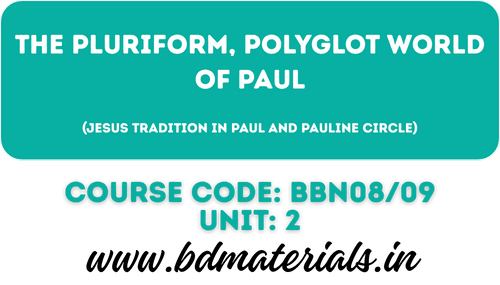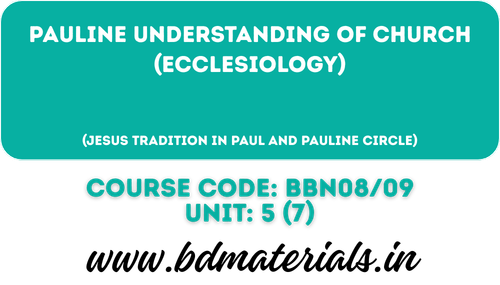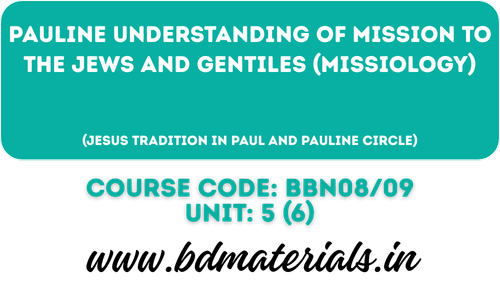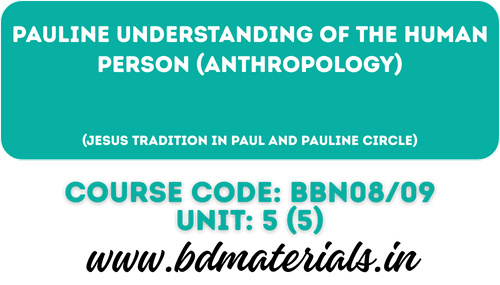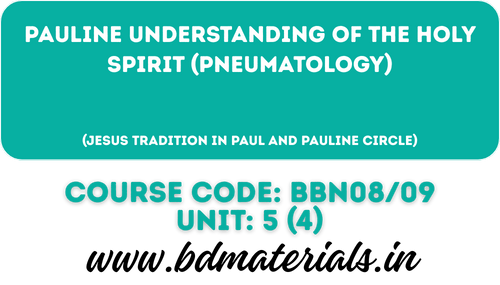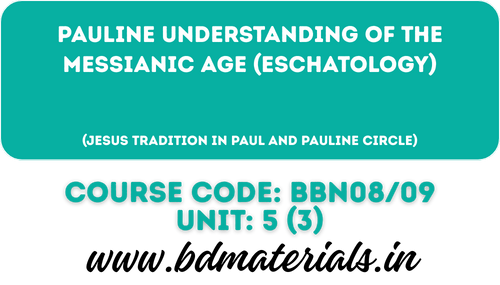The pluriform, polyglot world of Paul
Paul is considered as the embodiment of diverse background. Paul was a complex person whose identity included at least four major components — he was a Jew by birth, a Greek by culture, a Roman citizen, and a Christian by faith. The word ‘Pluriform’ can be interpreted as something which has a diverse background. And the word ‘Polyglotic’ is related to knowing or using many languages — Paul as a Jew, used Aramaic at home and spoke Greek as his mother tongue in the Hellenistic synagogue and elsewhere. The Pluriform and Polyglotic world of Paul are responsible for shaping and developing Paul’s theological convictions. It is often suggested that there are at least six factors such as: OT, Judaism, Hellenism, Jesus’ appearance to Paul on the way to Damascus, the Early Church tradition, and Paul’s apostolic experience. Each of these factors seems to have influenced Paul greatly but these influences vary and the vitality of influences in some aspect of Pauline theology does not equate with one another.1 Paul’s pluriform and polyglottic influence could be the reason he could preach the gospel authentically to all kinds of people despite of their diverse cultures, languages, traditions and religions that existed during his time.
2.1. The Heterodox Jewish World (Judaism)
Paul was a Jew by birth. His lineage goes to the tribe of Benjamin (Rom 1 Paul look back with pride his life as a Jew saying that he was circumcised on the eighth day, of the people of Israel, a Hebrew born of Hebrew as to the Law, a Pharisee (Phil 3:5-6; Gal1:14). For Paul, his Jewish heritage seemed more important than the society where he was brought up at Tarsus in a Cilician city and also his Roman citizenship.
In Jerusalem he studied under the feet of Gamaliel, who was one of the respected members of the rabbinate of his time, was a Pharisee (cf. Acts 5:34), also a disciple of Hillel (Acts 22: 3). It is probable that he was from a very strict Pharisaic family, in fact, he was only claimed to be a son of Pharisees (Acts 23:6). The name “Saul” recalled the first King of Israel, incontestably the greatest man of the tribe of Benjamin is Jewish name, which tells Jewish world of Paul. Indeed, Paul was in the midst of the heterodox Jewish world and that is seen from the factors that influenced him in his writings.
The Jewish background makes him quote the OT to stress the unity of God’s action in both dispensation and often as announcing the Christian Gospel or preaching for Christ. He quotes the OT (90 direct citations). usually according to the LXX. As a Jew he thinks and expresses himself in OT categories and images that clearly reflect in his writings,2 for instance, The Law: The Law / Torah remained the pre-occupation of the Pharisees (Ps 1: 1-2). “The Torah meant to the Jews the sum and substance of all that is good and beautiful, of all that is worth knowing.” Trade: As every Rabbinic student was expected to possess a trade, Paul picked up the one of tent making (Acts 18: 3). A Rabbi is not expected to live on the Law. According to the Jewish tradition, “A father who does not teach his son a trade, teaches him to steal.” Later on he did really work with his own hands (1 Thess 2: 9; I Cor 4: 12; 2 or 1 1:27). Jewish Apocalyptic: Paul has certainly been influenced by the Jewish apocalyptic. The pre-occupation with the day of the Lord in 1 Thessalonians 4: 13 — 5: 1 1; 2 Thessalonians 2:1-12, the evocation of the wrath of God in Romans 1: 18-20, the sense that the end of the world has come in 1 Corinthians 7: 26, 29, 31; 10: 1 1, 32 and the general resurrection in 1 Corinthians 15, all bear out Paul’s debt to the apocalyptic. Hagar-Sarah OT story reproduced again (cf. Gen 16:17 in Gal 4:21-25) the practice of circumcision, circumcision occupied a central place of cultural and religious identity.3 Jews fundamental tenet of Judaism on circumcision was valued as an outward sign of Israel’s privileged position. We see in Genesis 17:9-14, the sign of the covenant between God and Israel. The Jews regarded themselves as ‘the seed of Abraham.’ members of God’s covenant with Abraham and his descendants through the rite of circumcision, and so heirs to the promise made to him.4 Philo too saw the unique Jewish identity.5 All males who wish to be Jews must circumcise.6 In this way the covenant distinguishes between Jews and others – the Greeks. This becomes the best means in interpreting the gospel in his mission. Indeed. most of his theology such as his belief in monotheism, his understanding of humanity. righteousness. justification, redemption, clearly reflects his Jewish milieu.
2.2. The Hellenistic and Mystery Religious World
Despite Paul much influenced by the Jewish heritage, however, the Hellenistic culture from literary as well as theological point of view IS also clearly reflected the Hellenistic milieu. Paul was at home in the Greco-Roman world. It is well estimated that Paul knew a number of Greek philosophers whom he admired and in the later period influenced him and his theology greatly. Tarsus was “no insignificant City” (Acts 21: 39), a capital of Cilicia, a Roman province since 66 BCE. It was a centre of commerce and trade as it situated on river Cydnus. It was also famous for philosophers, especially those of the Stoic school, like Antipater, Archedemus, Anthenodorus (he even governed the city for a period) and others. One born in such a place could not but have been influenced by the atmosphere of this city. His preaching sometimes reflects the Cynic-Stoic diatribe (Rom 2: 1-20; I Cor 9). His catalogues are similar to the catalogues of vices and virtues put forth especially by Stoic philosophers (Gal 5: 19-23). In his letters, Paul reflected heavily from his knowledge of Stoic philosophy, using Stoic terms and metaphors to assist his new Gentile converts in their understanding of the revealed word of God.7 The style of the LXX has influenced him. He was probably acquainted with classical authors as well: Menander (I Cor 15: 33), Epimenides (Titus 1: 12) and Aratus, Epimenides (Acts 1 7:28). His epistles bear testimony that the Greek philosophy overshadowed his Hellenist and Roman background. The theology of dichotomy (dualism) becomes a more influential one in Pauline epistles.8
The name Paulos itself is a Greek name. His letters were written in Greek and his use of LXX all reveal and confirmed of his Hellenistic background. The influence of a Hellenistic culture is seen in his use of images and terms derived from a city-culture: Commonwealth (Phil 2: 30) and fellow citizens (Phil 3:20; Eph 2:19) are Greek political terms; Philippians2: 16 contains an allusion to Greek Games – race; account (Philm 18) is a Greek commercial term; heir (Gal 3: 15) is a legal designation and slave-free (1 Cor 7:22) is an expression drawn from the slave-trade; hope, joy and crown (1 Thess 2:2:1 9) reflect the Hellenistic celebrations in honour of the Emperor’s visit.9
It has been found that all the mystery religions have so called cultus-myth — a mythological story concerning the deity worshipped in the cultus, whether it that be he dies and come to life again or that he gains victory over the powers or gods that fight against him, but always with a tendency toward redemption of Zeus. The Ancient Greece had Eleusinian mysteries in which Cora, daughter of Demeter, brought to Hades by Pluto, was restored to her mother by the worship of Osiri (the masculine) and the Isis (the feminine) was fused symbolizing the victory over death.10 In the cultus, the initiatives receive a share in the victory, resurrection and immortality of the deity worshipped by them. Participation of the initiatives in the cultus take place in manner of mysticism and of the magical-materialistic idea “sacrament” consisting of emersion in manner of sprinkling with water or blood, putting on the deity, transcending all sense experience. In mystery religions, there is no fixed doctrinal system and even the myths are received in all sorts of ways. To receive immortality or redemption, one needs initiation into certain rites with certain knowledge (gnosis) of secret language through the initiator, the knowledge of which should be kept in strict secrecy.11
Mystery cults were prevalent in the Hellenistic World and Paul seemed dependent on the mysteries. For instance, the sacramental acts in the mystery religions and the communion of Baptism and the Lord’s Supper connected by Paul with Christ’s death and resurrection. According to Bousset, Paul or his successors transferred primitive Christianity into a mystery cult. He also argues that many of the Christian groups in the Hellenistic world had been mystery fellowships which now simply worshipped a new god, Jesus as Kyrios, a title commonly given to the god-hero in the cult and ritual of the mysteries.12
2.3. The Roman World
Nowhere in his letters does Paul explicitly mention that he was a Roman citizen. Nevertheless, there are a variety of good reasons to consider him in this light. Acts of the Apostles says Paul was a Roman by citizen (Acts 16:37-39). Acts 22:25-28 tells us that he was born a Roman citizen. Some suggest that Paul’s father must be a Roman citizen if Paul was born a Roman citizen. Roman citizenship was originally confined to freeborn natives of the city of Rome, but later when the Roman Empire extended to Italy and Mediterranean lands, the citizenship was given to other people as well who were not Romans by birth. But how Paul’s family from Tarsus (Jews city) got Roman citizenship IS still not clear. Paul appealed to the emperor, going over the head of the local procurator in Judea, something that only a Roman citizen could have managed successfully (Acts 25:10-12). Acts 28: 16 also hints that Paul was a person of considerable status because such respect and courtesy were normally given to Roman citizens.13 Perhaps Paul was proud of his citizenship.
Certainly, Paul’s Jewishness was a more primary factor in his identity than that of his Roman citizenship. However, it was possible for a person to hold more than one citizenship at a time, so we cannot dismiss the possibility of Paul’s Roman citizenship simply because he was a citizen of Tarsus (Acts 21:39). It may be that Paul’s family provided a great service to the Romans, perhaps by making tents for the Roman army, and as a result were granted citizenship. Paul might have chosen to use his Roman citizenship only opportunistically, particularly in order to advance the gospel or, as in the drama played out in Acts 22-28, to get himself to the locale to spread the gospel. Paul, as a bonafide Roman citizen and his social status opened doors for him throughout the Roman Empire. As a Roman citizens Paul had a preferential position in relationship to Roman law and justice; he was more likely to have access to privilege and protection while travelling Roman roads, if he wished to call upon it. Yet Paul was apparently reluctant to speak about this matter. Perhaps, in a status-conscious world he did not want the reception of his gospel to stand or fall on the basis of his social status.14 Whatever, he was greatly influenced by the Roman world in many ways. For instance, the concept of oikoumene “one world” the one world that Alexander the Great dreamt of establishing, was realized on the Roman Empire. Later this concept help him to come out with his universal outlook of mission.
2.4. The Early Christian (Pre-Pauline) World
Paul as a Christian has often focused its discussion just on his conversion, by ignoring the rest of his Christian life. There are divided views on the experience near the Damascus. For some scholars the experience on the Damascus Road was only a prophetic call not a conversion from Judaism to something else (Krister Stendahl). And for others it’s not only a call but Paul, the former zealous Pharisee has been radically change in his worldview could quite properly called a conversion (Ben Witherington).15 Whatever, Paul clearly regarded the experience near Damascus as the turning point and that brought about a complete transformation in Paul’s outlook. For Paul, an encounter with the risen Lord becomes a driving force that seized his entire life (Phil 3:12) and his mission (l Cor 9:16). The revelation of the crucified “Lord of Glory” not only turned Paul the Pharisee into an apostle but also made him the first Christian Theologian.
The Damascus experience of Paul gave a new meaning in the death and resurrection of Jesus Christ. Before Paul knew the crucifixion of Jesus was a curse according to Deuteronomy 21 :23 (cf. Gal 3:13). This could be the reason why Paul couldn’t accept Jesus as the Messiah (cf. I Cor 1:23). However, after the incident near the Damascus the very death and resurrection of Jesus became the means of freeing humanity from impending judgment. For Paul, thus the cross, which had been a stumbling block to Jews, became the power and wisdom of God (1 Cor 1:24). Moreover, the experience near Damascus taught him that the Messianic Age had already begun with the life and ministry of Jesus but not yet in Glory (1 Cor 10:11). Earlier, the Messianic age stands in the strings of the redemptive history of Israel. Paul saw human history into three periods: from Adam to Moses (the covenant), from Moses to the Messiah (the law) and the messianic age.16 Messianic coming fulfil the promises given in the prophets (Rom 1 :2) and his mission were accomplishing accordance with the scripture (1 Cor 15:3). He preserves the function of the expected Jewish eschatological redeemer. He is yet to appear in glory to establish his Kingdom where the whole creations will join with humankind (2Tim 4:1, 2Thess 1 :5, Rom 8:1 8ff); he will be the judge of human (1 Cor 5:10) and will destroy the wicked with the breath of his mouth (2Thess 2:8).
The early Christian traditions also held responsible in shaping his way of thinking. Many terms and images especially of the apostolic traditions reflected in his letters. They are like, the “Early Christian Eucharistic Formula” (1 Cor 1 1:23-25), “Ameri’ (Gal 8), “Maranatha” (1 cor 16:22), “Abba” (Gai 4:6), Hymns (Phil 2:6-11), “the Messiah” (Rom 9:5), “Lord” and “Son of God”. Paul thus incorporated the early Christian traditions and employed them in his writings.17 These terms / words were not coined by Paul. But even before he became an apostle of Christ, they were already in used in the early churches. It is needless to say that the Damascus experience left an enormous impact in the life of Paul. It IS not only his sense of calling but also several other aspects that made him to be an apostle to the Gentile.
Foot Notes
- Vanlalnghaka Ralte, “The Soma Motif in Pauline Soteriology,” M TJ VII (Jan – June, 2007): 48.
- Matthew Thekkekara, The Letter of St. Paul: Face of Early Christianity (Bangalore: Kristo Joyty Pub., 2005), 18
- Robert G. Hall, “Circumcision,” The Anchor Bible Dictionary, vol. 1, A-C. edited by David Noel Freedman et al. (London: Doubleday, 1992). 1025; John Stambaugh and David Balch, The Soctal World of the first Christians (London: SPCK, 1986), 48.
- Troy W. Martin, “The Covenant of Circumcision (Genesis 17:9-14) and the Situational Antithesis in Galatians 3:28,” JBL, 122/1 (2003): 117.
- Wayne A. Meeks, The First Urban Christians: The Social World of the Apostle Paul (London: Yale University Press, 1983), 36-37.
- Tunchapbo, “Pauline Understanding of Conversion… , 68.
- Howard Kee and Franklin W. Young, Understanding The New Testament (Englewood Cliffs, New Jersey: Prentice Hall, Inc. 1958), 208.
- Thekkekara, The Letter of St. Paul: Face of Early Christianity, 16-17.
- Keci Sian, Paul, Women & Female Imagery: Approaching Difficult Passages (Aizawl: RDDAICS, 2010), 123.
- For further reading see H. Ridderbos, Paul: An Outline of His Theology (London: SPCK, 1977), 22.
- Ridderbos, Paul: an Outline of His Theology, 23.
- Cited in J.K. Kselman and R.D. Wittherup, “Modern New Testament Criticism,” NJBC (Bangalore: TPI, 1994), 1136-1137.
- Ben Witherington III, The PAUL QUEST: The Renewed Search for the Jew of Tarsus (Illinois: InterVarsity Press, 1998), 69-70.
- Witherington III, The PAUL QUEST: The Renewed Search for the Jew of Tarsus, 71-73.
- See in Witherington Ill, The PAUL QUEST: The Renewed Search for the Jew of Tarsus, 77-78.
- Sian, Paul, Women & Female Imagery: Approaching Difficult Passages, 125.
- Sian, Paul, Women & Female Imagery: Approaching Difficult Passages, 125-126.
Friendly Note
Greetings in the name of our Lord Jesus Christ! We are deeply thankful for your visit to BD Materials. It is our mission and joy to serve Bible students, pastors, and believers with high-quality theological resources that strengthen faith and understanding of God’s Word.
At BD Materials, you’ll find study notes, articles, question papers, and valuable academic content designed to support your biblical and theological education. We are dedicated to helping you grow in knowledge, ministry, and devotion to Christ.
We also invite you to explore our partner sites: Telugu Gospel Lyrics, featuring inspiring gospel song lyrics in Telugu, and Theological Library, a hub for Christian book summaries and devotionals.
Your encouragement means a lot to us! We invite you to share your study materials, articles, or insights with our community. Thank you for being part of this mission—may God bless your studies and ministry abundantly!
